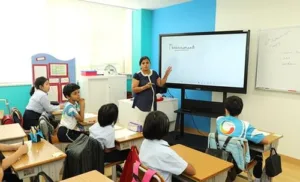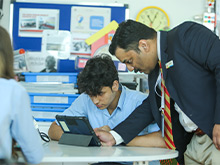Download our FREE Academic Calendar now! 📚 Start your child’s journey to success.
It’s surprising how we are able to perform so many tasks at one time and still not feel proud. As soon as we wake up, we take charge of our day and perform multiple tasks like preparing and eating breakfast, putting on clothes, and so on. Did you ever wonder how we are able to perform all these tasks and never get seriously bothered? Well, this is what fine motor skills mean.
Adults have responsibilities to fulfil, and that requires well-managed motor skills. What about your kids? Let’s not assume that kids should be introduced to fine motor development in their growing years.
Many studies suggest focusing on your child’s motor skills since their birth. We all have seen new-born babies being pampered with oil massages and light stretches. As much as it boosts internal strength, it also develops motor skills.
To clear the air, let’s understand what fine motor skills are.
What Are Fine Motor Skills?
Fine motor skills include movement of hands, fingers, feet, wrists, and toes. Simply put, these skills need your child’s brain to coordinate impulses and actions. What they see and what they react to it is what fine motor skills comprise. To give an example, picking up a pencil to write and using a spoon to eat. This might make the phenomenon easy to understand.
Children cannot be taught every little thing they do. We have the capability to understand a few things that impact our daily routine. Fine motor skills for kids involve pressing, folding, holding, grasping, or using a pincer grip. Everything that seems too normal to us actually needs time to get familiar with.
Fine motor skills development is quite important for children in preschool and kindergarten. They learn how to respond to a few sights and be independent in several ways. Even though it is unexpected for a tiny kid to understand what all this means. As a parent, it is important to monitor your kid’s developing skills and encourage them to be more responsive.
Why Are Fine Motor Skills Important?
If you ask yourself why tying a shoelace is important, it would sound weird, right? Fine motor skills are important to carry out everyday tasks like tying shoelaces, writing, holding a pen, or even making hand movements.
We have been performing these tasks for years and usually downplay their importance. We need to realise that the multiple tasks we are performing in our daily lives need a special skill set and use a set of muscles. Now that we know, let us give ourselves a little credit.
We usually see many children not able to perform these daily tasks, which probably impacts their self-confidence in the worst way. Not just the confidence, a lack of fine motor skills also affects their independence skills, self-care development, and even their academic performance.
We can imagine a child struggling to fulfil the essential daily activities. And one of the potential reasons is underdeveloped motor skills.
Parents today are probably unaware of such cases and neglect them quite easily. Of course, they are not to be blamed. Perhaps, the lack of awareness causes such issues during the child’s growing years and affects them in the future.
Not to mention, a lack of motor skills can also impact the mental health of your child. It is best to observe children during their developing years and take care of them if found with the slow fine motor skills development.
How to Improve Fine Motor Skills?
The possibility of recognizing the slow development of fine motor skills in your child is quite moderate. And, just to clear the air, it is nothing major or concerning. Being slow with understanding the muscular mechanism to perform everyday tasks is nothing serious yet important to consider.
If you just realised that your child is finding it difficult to cope with the daily activities, be a responsible parent and find some ways to improve their fine motor skills development. For the record, only a parent is patient enough to walk as slowly as their little kid walks. So, why not take a step ahead and protect your child from future issues?
Here are some playful methods by which a parent can help their children to improve their fine motor skills activities:
1. Play Dough
We all know how playing with the dough requires the right amount of pressure, subtle hand movements, and perfect shape ideas in mind.
Playing dough with your child will give you enough time to enjoy yourself with your child and improve their fine motor skills. The more time they spend putting their hand movements and mind together, the better.
2. Puzzles
There is no better way to polish your child’s mental capabilities than to solve interesting puzzles with them. This involves the right pairing of your child’s mind and actions which again boosts their fine motor skills.
3. Drawing and Painting
“Colours attract children,” and we can’t agree more. Little kids always fascinate playing with colours. Surprisingly, they try to give their best while drawing or painting. From holding a brush to painting the strokes in even directions, everything demands uniformity which ultimately enhances the fine motor skills in children.
4. Using Kitchen Tongs
Yes, this fine motor skills activity is a bit strange, but perhaps it works like wonders. Keep your child involved while you work in the kitchen and give them kitchen tongs or tweezers to play with. Observe how they manage to use them in a balanced way. And, Voila! You’ve managed to induce better motor skills development in your child.
5. Bath Play
One of the most fun activities is bath time play with your child. Your child would protect their eyes and nose from water splashes for obvious reasons. Take advantage of the reflex actions and watch how your child reacts and acts during the playtime. If they are quicker with their water blocking than the last time, congratulate yourself later.
6. Lacing
Helping your child tie the laces of the shoes is yet another and quite effective activity to enhance the functionality of their mind. Tying shoelaces needs the proper coordination of palms and fingers simultaneously. Understanding the movement is an effective way to sharpen fine motor skills.
Examples of Fine Motor Skills for Pre-schoolers
Fine motor skills for pre-schoolers include:
● Cutting with scissors.
● Holding and using a pencil.
● Playdough manipulation.
● Building with blocks.
● Drawing with markers or scribbling.
Pre-schoolers are already on the edge of their growing age and must be excellent with their fine motor skills development. The issue has been so widely acknowledged in the past few years that the majority of schools and their staff members are continuously observing children with low fine motor skills.
Understandably, parents will stay patient with their child’s growing tendencies; perhaps, lack of anything can work as a drawback in the fast-moving world. Fine motor activities for kindergarten are proactively helping the kids move past their inadequacies in performing the daily tasks. The activities are specially prescribed for improving the motor skills of your child.
It is usually said that “childhood is not a race to see how quickly a child can read, write and count. It is a small window of time to learn and develop at the right pace for each individual.”
GIIS Bangalore CBSE school is the right place for your little ones as the faculty strictly focus on building fine motor skills for preschoolers. The GMP curriculum offered at GIIS is a perfect blend for renowned Montessori approaches and contemporary learning methodologies which builds a strong foundation of those young students.
Rightfully so, learning how to perform daily tasks is no more a part of the competition. It is the practice to fit in the given time window before it gets too late.



































